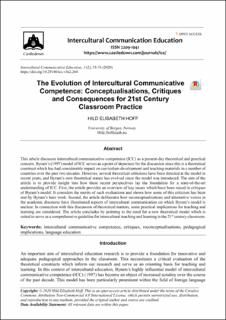The Evolution of Intercultural Communicative Competence: Conceptualisations, Critiques and Consequences for 21st Century Classroom Practice
Journal article, Peer reviewed
Published version

Åpne
Permanent lenke
https://hdl.handle.net/11250/2766798Utgivelsesdato
2020Metadata
Vis full innførselSamlinger
Originalversjon
Intercultural Communication Education. 2020, 3 (2), 55-74. https://doi.org/10.29140/ice.v3n2.264Sammendrag
This article discusses intercultural communicative competence (ICC) as a present-day theoretical and practical concern. Byram’s (1997) model of ICC serves as a point of departure for the discussion since this is a theoretical construct which has had considerable impact on curriculum development and teaching materials in a number of countries over the past two decades. However, several theoretical criticisms have been directed at the model in recent years, and Byram’s own theoretical stance has evolved since the model was introduced. The aim of the article is to provide insight into how these recent perspectives lay the foundation for a state-of-the-art understanding of ICC. First, the article provides an overview of key issues which have been raised in critiques of Byram’s model. It considers the merits of such evaluations and shows how some of this criticism has been met by Byram’s later work. Second, the article deliberates how reconceptualisations and alternative voices in the academic discourse have illuminated aspects of intercultural communication on which Byram’s model is unclear. In connection with this discussion of theoretical matters, some practical implications for teaching and learning are considered. The article concludes by pointing to the need for a new theoretical model which is suited to serve as a comprehensive guideline for intercultural teaching and learning in the 21st century classroom.
